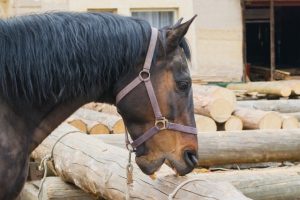Stereotypies in Horses: New Research
By Kentucky Equine Research staff:
Owners of horses suffering from stereotypies: fret no more! A new study* shows that horses with repetitive behaviors learn at the same rate as horses without stereotypies and do not appear to be cognitively impaired, as once thought.
The research team stated their results “challenge the widely held belief that crib-biting horses, and stereotypic animals more generally, are cognitively impaired. We conclude that cognitive underperformance may occur in stereotypic horses if they are prevented from crib-biting to cope with experienced stress.”
Stereotypies are repetitive behaviors with no apparent goal or function. Common stereotypies include crib-biting, weaving, and stall-walking. The underlying cause of stereotypic behavior in horses remains unclear. Two major hypothesis include: (1) a defect in a region of the brain called the basal ganglia that makes them “less cognitively sensitive” than horses that do not engage in stereotypic behavior, and (2) artifacts of a captive environment involving restricted, suboptimal housing conditions, which can be referred to as a frustration-induced behavior.
“These data suggest that preventing stress early in life and managing each horse individually—much like parenting and teaching children—could prevent the onset of stereotypic behaviors,” suggested Kathleen Crandell, Ph.D., a Kentucky Equine Research nutritionist.
Other methods of potentially preventing or controlling stereotypies are:
- Offering a high-fiber diet and more frequent meals;
- Turning out horses as often as possible;
- Ensuring horses have eye contact with others;
- Providing free-choice hay to stalled horses early in life to prevent the development of stereotypies (this practice reportedly does not affect cribbing behavior in confirmed cribbers but could prevent the behavior from developing);
- Using tongue-activated fiber dispensers (which appear to be more effective instead of liquid dispensers);
- Providing feeding puzzles in the shape of a ball that contain a food reward;
- Utilizing enrichment tools with a food reward rather than nonfood-related products;
- Using cribbing straps or anti-weaving bars;
- Removing or modifying surfaces on which cribbing may occur;
- Hanging obstacles at the front of the stable to prevent weaving; and
- Tying or obstructing the path of stall walkers.
“The best prevention for stereotypic behavior is thought to be the provision of ample grazing opportunities to young horses, such as foals, weanlings, and yearlings. Despite this, even horses on pasture can develop stereotypic behaviors,” noted Crandell.
Nutritional changes may also be beneficial. Omega-3 fatty acid supplements derived from fish, such as EO-3, have been found to help support learning and behavior in animals, including humans.
“Offering EO-3 to pregnant mares throughout gestation and to foals early in life supports development of the nervous system,” said Crandell.
*Briefer Freymond, S., A. Ruet, M. Grivaz, et al. Stereotypic horses (Equus caballus) are not cognitively impaired. Animal Cognition. In press.











